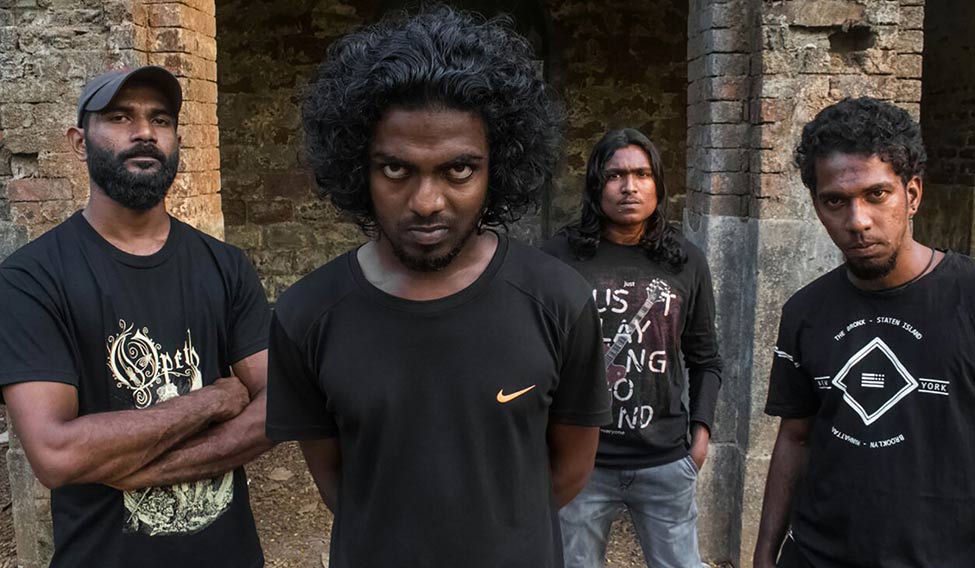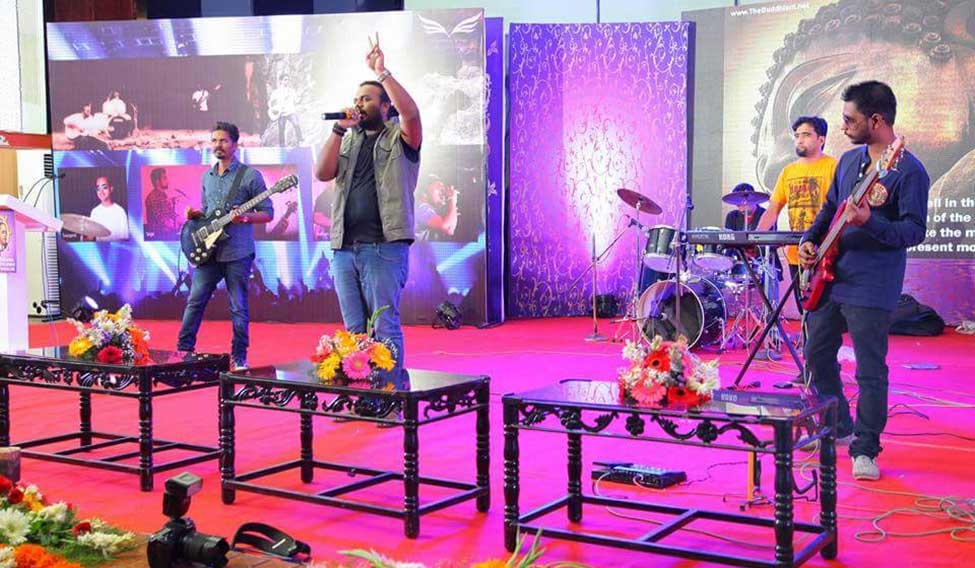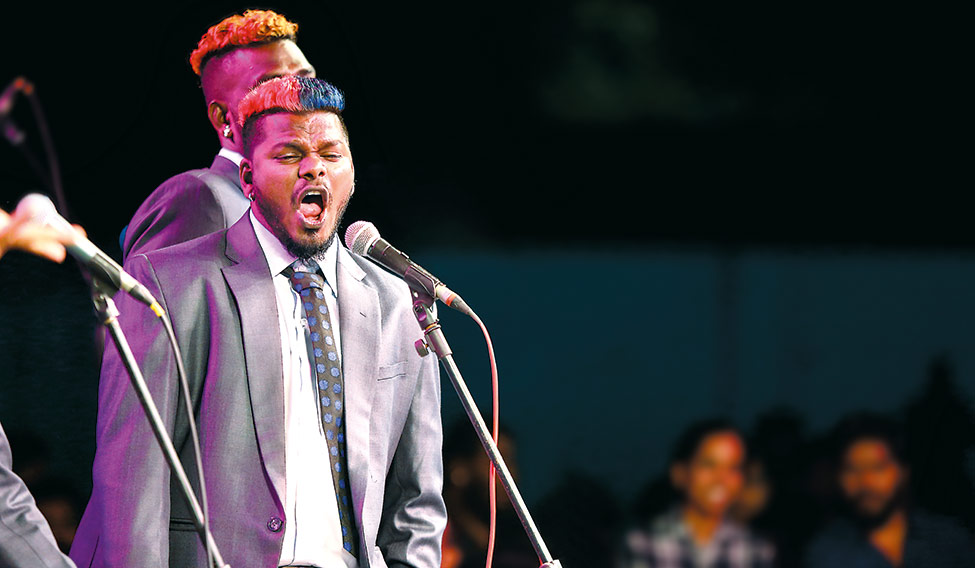On December 31, 2017, Kabeer Shakya and his band Dhamma Wings performed before a huge crowd at Koregaon Bhima in Maharashtra. For Shakya, it was a moment of pride; he had released two powadas—traditional Marathi ballads of valour—celebrating the 1818 victory of dalit Mahar soldiers in the British regiment over the Peshwas. It was only the next morning that he heard of bloody clashes between allegedly casteist outfits, who opposed the march, and dalits who had assembled to commemorate the event. At least one death was reported in its aftermath. “What is happening in this country?” asks an agitated Shakya. “Enough is enough.”
The computer science graduate, who hails from Mumbai, had spent three months as a Buddhist monk in Bodhgaya. Through his music, he urges people to imbibe the values of equality and tolerance preached by Bhimrao Ambedkar and Gautam Buddha. “We are not against any religion or any person. We raise our voice against discrimination, whoever be the one perpetuating it,” he said. While the ‘Buddhist’ rock band has many popular numbers under its name—like Buddhang Namami and Prabuddha Ho Manava—their maiden piece Jai Bhim Se is undoubtedly the biggest hit. “The reaction it got online was mindblowing,” says Shakya. Skirting between serene verses and melancholic interludes, the song is an understated ode to the father of the Constitution.
Koi nahi tha mere liye | I had no one
Unhone apna jeevan tyag diya | He sacrificed his life
Aandhi tufano se ladte rahe | He fought storms and typhoons
Mujhe apne pairo pe khada kiya | Made me stand on my feet
 Message for the masses: Death metal band Willuwandi and rock band Dhamma Wings (bottom) find their music inspired by social reformers like Ambedkar and Buddha.
Message for the masses: Death metal band Willuwandi and rock band Dhamma Wings (bottom) find their music inspired by social reformers like Ambedkar and Buddha.
Come January 26, Shakya will release a new single, Democracy Zindabad, which, he says, is necessitated by recent incidents. With their skyrocketing popularity (they will perform, representing the country, at a major event in Thailand), comes a sobriquet: India’s first dalit rock band. Shakya is extremely wary of such labels, and quick with his retort: “Our band has members from all castes and communities. If a filmmaker from an upper caste community makes a documentary on discrimination, will he be called a dalit filmmaker? Either you tag everyone who fights against casteism a ‘dalit artist’, or stop with this double standard.”
Shakya is just one among a rising crop of youngsters waging a war against casteism and discrimination with their music. More significantly, if such voices were once relegated to the fringe, they are now enjoying unprecedented mainstream and commercial acceptability.
Ginni Mahi, 18, from Jalandhar in Punjab, is a rising YouTube star whose folk rap invokes Buddha, Ambedkar and Sant Ravidas—a social reformer and a doyen of the Bhakti movement. Through her albums—Gurpurab Hai Kanshi Wale Da or Guran Di Deewani, and extremely popular songs like Fan Baba Sahib di or Danger Chamar—her own dalit experiences are unpackaged in infectious beats and catchy hooks. “I am the daughter of Babasaheb Ambedkar,” she asserts proudly in her songs, “one who is not scared to sacrifice. Chamar is the real thing.”
In the politically conscious Dravidian heartlands, anti-caste movements find a natural ally. Take the case of The Casteless Collective (TCC), a 19-piece music collective that was founded by Tamil filmmaker Pa Ranjith and his organisation Neelam Cultural Centre, along with Madras Records. They had, in the first week of January, performed before a 5,000-strong crowd at Kilpauk in Chennai, narrating the life of Ambedkar and addressing a variety of socially relevant topics, to a rousing reception. “Never before,” says TCC music director Tenma, “have independent bands without any star value elicited such a response.” According to the collective, director Pa Ranjith had embarked on this project with the full realisation that caste is a topic that needs to be addressed, and sweeping it under the rug was no way to treat the malaise.

Their music is a strange fusion of rock, rap and gana—a Tamil indigenous art form that was long considered a voice of the sidelined, sometimes heard on occasions like funeral processions. Gana is intrinsically organic to the land, an elegy to the forgotten lives of Chennai. With such a large number of musicians, from different ends of the artistic spectrum, where is the common ground? “We auditioned about 100 gana musicians for this project,” says TCC music director Tenma. “Gana and rap come from the same emotional place. It is working class music. In this form of music, you will notice that there is a lot of primal beats going on, sometimes for hours. There is no form; it is more about the stories. I couldn’t get them to pop or rock. I had to go where they were and convert that into pop or rock. In my mind, this project pertains more to world music than any other genre.”
In neighbouring Kerala, the sounds of assertion and self-respect take on varied hues. In the case of metal band Willuwandi, the name itself is derived from the iconic villuvandi yatra (bullock-cart trip) by the fiery social reformer Mahatma Ayyankali in 1893 in Kerala. At a time when the untouchables—the community that he was born into—were not allowed to use public roads, Ayyankali rode through the streets on a cart yoked to two white bullocks. Willuwandi—which calls their dark, ominous, black/death metal brand of music as ‘wake up songs’—considers itself the ideological descendants of Ayyankali, saying that they are looking to propagate the ideals of justice, freedom and enlightenment. “The thoughts of social reformers like Sree Narayana Guru, Pandit Karuppan, Ambedkar, Sahodaran Ayyappan and Buddha influence us,” says Sethu, the founder of the band, and a final year student at Maharaja’s College, Ernakulam. One of their songs, titled Black God, is dedicated to Ambedkar, while another one Najeeb draws attention to the case of the missing JNU student.
“Musicians and artists have the ability to effect change,” Sethu said. “Just look at what the music of Jimi Hendrix and John Lennon did to help usher in European enlightenment.” His tone grows wistful. “My biggest wish is to perform in front of a huge crowd at Deekshabhoomi in Nagpur, where Ambedkar converted into Buddhism.”
Says Shakya, “What happened at Koregaon Bhima showed us that we should not stop singing. It proves that what we are talking about is only too real a phenomenon in free India.”







